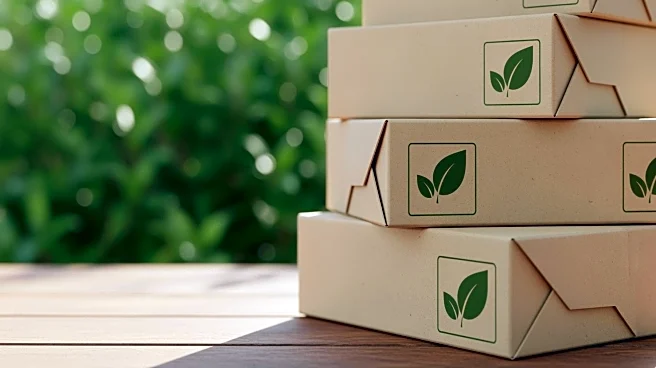What's Happening?
SIG Terra has introduced a new line of aseptic cartons that are free of aluminum, aiming to significantly reduce the carbon footprint associated with packaging. According to a lifecycle assessment conducted
by IFEU, these new cartons can lower carbon emissions by up to 61% compared to traditional aseptic cartons that include an aluminum layer. The assessment, which adheres to ISO standards on lifecycle assessments, also indicates substantial reductions in eight out of ten environmental impact categories. This initiative is part of SIG Terra's broader strategy to enhance sustainability in packaging without compromising product safety and shelf life.
Why It's Important?
The introduction of aluminum-free cartons by SIG Terra represents a significant advancement in sustainable packaging solutions. By reducing the carbon footprint of packaging materials, the company is addressing growing environmental concerns and consumer demand for eco-friendly products. This move could influence other companies in the food and beverage industry to adopt similar practices, potentially leading to widespread environmental benefits. The reduction in carbon emissions aligns with global efforts to combat climate change and could enhance SIG Terra's market position as a leader in sustainable packaging solutions.
What's Next?
As SIG Terra rolls out its aluminum-free cartons, the company may focus on expanding its market reach and encouraging adoption among major food and beverage brands. The success of this initiative could prompt further innovations in sustainable packaging, potentially leading to new industry standards. Stakeholders, including environmental groups and regulatory bodies, may closely monitor the impact of these cartons on reducing carbon emissions. Additionally, consumer response to these eco-friendly options could drive further demand for sustainable packaging solutions across various sectors.
Beyond the Headlines
The shift towards aluminum-free cartons highlights a broader trend in the packaging industry towards sustainability and environmental responsibility. This development may prompt discussions on the lifecycle impacts of packaging materials and the importance of comprehensive assessments in guiding sustainability decisions. The move also underscores the role of corporate responsibility in addressing climate change and the potential for businesses to lead in environmental innovation.









